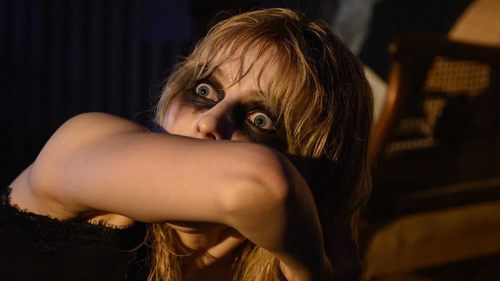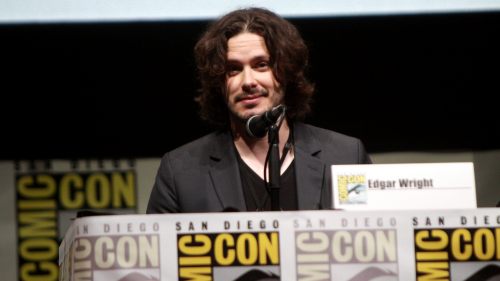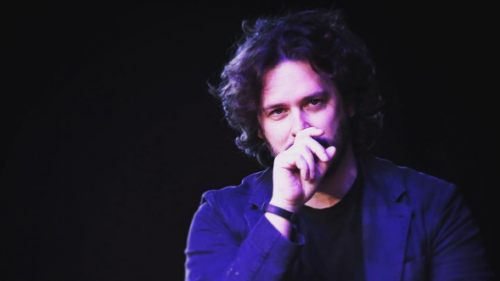Edgar Wright Talks BABY DRIVER And Steering His Characters Down The Road To Salvation
Baby Driver is out now! Get your tickets here!
“Music is an escape, and I think for a lot of people, it’s the one thing in their life that they can control”.
Edgar Wright looks somewhere off in the distance as he muses about his latest passion project, grinning from ear to ear. The man has made a career out of creating pitch-perfect genre flicks specifically engineered for genre fans, with countless terrific titles under his belt, including Shaun of the Dead, Hot Fuzz, The World’s End, Scott Pilgrim vs. The World, and now, Baby Driver. To put it simply, he’s got a great track record.
In a way, all of Wright’s characters are looking for a sense of control. In Shaun of the Dead, a man attempts to use the apocalypse to win back his girlfriend and gain control over his life again by retreating to familiar ground and repeating what he’s always done – drinking a pint and waiting for thing whole thing to blow over. In The World's End, a middle-aged nostalgia-driven waster thinks that he can touch glory once more if he can just complete the infamous pub crawl that brought him and his friends so much joy so many years ago. All of his main men, in one way or another, are seeking a sort of redemption – their life’s mission laid out before our eyes, made sympathetic, and expertly executed with well-timed laughs to boot. This is the wonderful world of Edgar Wright movies.
In his latest gem, Baby Driver, our leading lad is a bit younger, but looking for salvation all the same.
“Shaun of the Dead and The World’s End are more about mid-life crises whereas Baby Driver is about somebody recognizing ‘I want out of the life I am in’ before he’s even really a man” Wright explains about the relation between his films.
To Wright, Baby is just as deserving of absolution as Shaun or Gary King, despite the fact that he may have been flirting with a life of crime since the moment his feet could reach the pedals of an automobile.
Born under a bad sign, Baby (Ansel Elgort) tries to claw his way out of a batch of bad luck after he steals a car from the wrong guy, Doc (Kevin Spacey) at a young age, and becomes indebted to him as a getaway driver for all of his future bank jobs for years to come, with no expiration date in sight. One random day, Baby strolls into a nearby diner and runs into the woman who will quickly become the love of his life, Debora (Lily James). In a hurry to sweep the young lady off her feet and drive off into the sunset with her at his side, Baby races to pay Doc back for his wrongdoing in a hurry, pulling off as many jobs as he possibly can in a timely manner until he meets his quota. However, when Doc decides that Baby is his lucky charm, and makes it clear that he doesn’t fancy letting his favorite driver speed off anytime soon, Baby realizes that he’ll have no choice but to run away, pedal to the floor, his lover in the front seat, and the life he’s led slowly fading further into the distance of his rearview mirror.
“When Kevin Spacey decides that Baby is his lucky charm and that he’s not going to continue doing these jobs without Baby, it’s very difficult to start a new life” says Wright sympathetically. “So, it’s really just this idea of the movie that has a strong sort of moral kicker to it, that you start with the fantasy of being a getaway driver, but you end with the nightmare of being a criminal”.
Baby is actively participating in the illegal activity of robbing banks and paying criminals, making him at worst, one of the bad guys, and at best, one of the players on their team. However, despite these evidential truths, it’s difficult not to root for Baby. There’s just something about him, and all of Wright’s characters, frankly, that makes them so charming and endearing, no matter how hard they work to screw up, make fools of themselves, or just downright self-sabotage.
“I think that you know deep down that Baby is a good hearted guy. At the start of the movie I would say that he’s fooling himself that he’s not a criminal and he’s obviously aware of what he’s doing, he’s not an idiot, but he’s just kind of hypnotized himself into this idea. He’s in denial, basically” infers Wright. “So, I’m just the driver, and I’m working off this debt, and I’m not actually a criminal because if I’m just driving the car then I’m not a part of the rest of it. I think there’s even a point in the movie where Jon Bernthal literally says it, like, ‘You can’t be in crime and not be a criminal’. You know that Baby’s like, essentially a good guy, and you know that he’s just doing a job, but then it becomes very difficult to extradite this from his life”.
According to Wright, all of his characters are looking for second chances. Baby just happens to be looking for his second chance a little bit earlier in life than the others.
“In terms of the character of Baby, I think he is looking for a second chance. I think when he meets Debora, he’s looking for things to start over, and realizing actually the life he aspires to is not the glamorous one of being a criminal, he actually just wants to be a normal kid with her. The thing is the character started doing what he’s doing when he was very young, so he really needs a do-over at like age twenty. He’s already so neck deep in it at that point. So, I think like there’s a coming-of-age of Baby going from being a kid at the beginning to a man at the end, and starting to sort of take charge of his situation a little more than he has been at the start”.
Baby’s music is the actual soundtrack for the film, so whatever he is listening to in the moment that the action unfolds is exactly what the audience is listening to as well. This creates one of the most intriguing and thrilling action movie premises in quite some time – the music actually drives the movie. The tunes Baby listens to create a road map for what he’s supposed to do next, and thanks to Wright’s stellar direction, it creates a perspective for his audience to follow, as well.
“I wanted the audience to basically experience this heist movie through his eyes but also hear it through his ears. I just like the idea, being that a lot of people obviously with headphones create a bubble for themselves” Wright smiles as he veers off again into his thoughts. “It’s this idea that Baby foolishly maybe thinks that he’s got this bubble around him, and it’s going to protect him, and that’s not going to be the case. I also like the idea that music acts as like a salvation, but it also can be an obsession that’s debilitating for him if he doesn’t have the right thing playing”.
In the film, Baby suffers from a terrible ringing in his ears, and the music that constantly floods through his eardrums helps to drown it out. He even uses it to time the beats of his job as he drives around town at a rapid pace, drifting out of trapped intersections and averting the heat at a fiery pace. However, as the story rolls on, it becomes clear that the music isn’t just a way for Baby to ward off his hearing impairment and drive his accomplices back to home base, but as a way for him to shield himself from reality, as well.
As Wright brilliantly explains it, the way that Baby uses music isn’t that different from the way that the rest of us do – it both helps and hinders us. It propels us and brings us to a screeching halt. However, no matter what we use the killer tracks on our playlist for, the fact is that in the end, it provides all of us with a little sense of control, which is sometimes all we need in these hectic lives we lead, a mile-a-minute at a time.
“You can control what goes into your ears, so you essentially have a character that’s doing that. He’s just in charge of what he’s playing”.



